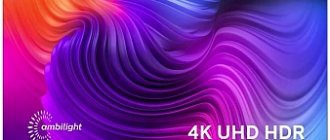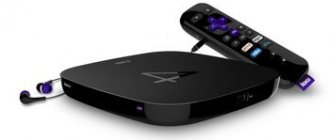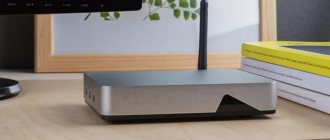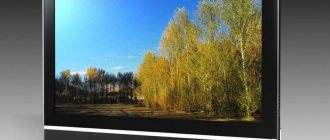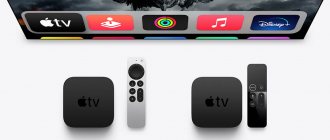If you need a “smart”, technologically advanced TV with Smart TV support, then it is important to choose the right operating system. Let's figure out which platform is better, more convenient, faster and more functional.
There are three main operating systems on the market: Tizen, WebOS, Android, each with its own features and tricks. There are other, less well-known ones, but the review will include only popular and proven operating systems.
Smart Share menu item
With Smart Share, you get access to all your digital devices connected to your LG TV. And you can view all available content from these devices on your TV screen. The advantage of this opportunity is the large TV screen. After all, viewing a movie from a computer or photos from a camera is better on a large screen with Full HD resolution than on a computer monitor, whose screen diagonal is 2-3 times smaller.
The connection can be organized using DLNA, combining all devices into a single wireless network. Via the USB connector you can connect an external hard drive, camera, video camera, etc.
Smart Share allows you to organize a local home network and share photos and videos over it.
All Smart TV platforms
When we told you How to choose your new TV, we already told you: picture and sound quality are the really important aspects . The rest of the features are add-ons that will help you decide which model to buy.
The problem is that if you want to answer your questions when comparing their smart TV platform, you need to know a little about what they offer and how they behave. Because it may also be that, despite the many options, for the way you intend to use the TV, you would prefer a more “basic” and more flexible option, if both offers convince you regarding picture and sound.
Anyway, let's focus on what interests us. Which option is better: webOS, Tizen, Android TELEVISION, ...? Before we answer, let's take a look at what they are like and what they have to offer.
Roku TV
Roku TV is an operating system that you may only know from its set-top box of the same name. However, a few years ago the company licensed its system so that other manufacturers could use it on their TVs. This was the case with brands such as TCL or Hisense.
At the interface level, Roku TV is very similar to what tvOS offers . Only there are some differences, such as the list on the left that helps you quickly access the Home page with all the installed applications or corresponding ones that Roku has as a movie or music store, among others. But overall the interface is very clean and easy to use, which is always appreciated.
With optimal performance, it has all the Netflix, YouTube, HBO, Hulu, etc. apps you might need. In addition, Roku offers exclusive stores and access to a number of channels. At least in the USA.
Internet connection
With LG Smart TV you can surf the Internet, just like on a regular computer using the built-in browser. But doing this with a remote control will be inconvenient, although you can purchase an additional keyboard for your LG TV. But from the remote control it is convenient to control pre-installed Internet services, which are available with one click.
Depending on the country in which the user is located and the firmware version of the software, the range of these services available on the smart TV depends. Usually these are YouTube, twitter, facebook, picasa, skype, popular local TV channels. There is access to services with films and music.
Various applications are available for download and installation on this website. For example, by installing a site application with music or movies, you can use the content of this site in one click by clicking on the application icon. For use on a TV, this is better than accessing the same site from a browser. TVs have some restrictions on using the Internet, for example, an “out of memory” error may occur, but using a special website application will eliminate this error. And access from the TV receiver control panel is much simpler, because you don’t need to use a browser and enter the website address. If, when installing a game, you do not have enough internal memory on the TV, you can install the game on a pre-connected USB drive. After installing applications, they will appear at the bottom of the screen in the Quick Launch bar or in the “my applications” menu item.
Via the Internet, a TV with a smart TV has access to streaming video (YouTube, movie sites, etc.), social networks, and various applications in the LG apps service .
Amazon Fire TV OS
Like Roku, Amazon has allowed Toshiba to integrate the Fire TV Stick system into its smart TVs (version 7 is based on Android 9 Pie). So you'll find a platform with an interface and experience identical to what you'd have if you connected Fire TV to your TV. Which also comes with the same issues, such as installing new apps that may not be as convenient as other options.
However, after a while you will adapt and you will have access to the main online content platforms, as well as services from Amazon itself and a number of additional features, such as games, that may interest you. And this, for brands like Toshiba, allows you to value your TVs, which, at least in Spain, do not enjoy the same success as other manufacturers such as LG or Samsung.
Which system is better to choose?
All three operating systems, implemented with the goal of effective user interaction with the device, have both their own features, advantages and disadvantages, and in addition, their fans. Getting to the key question, which operating system will be better for a TV with Smart TV, we will immediately say that there is no definite answer to it. This is rather a matter of convenience and preference (this applies to both the interface and functionality), so it is impossible to say that, for example, Web OS is better or worse than Taizen or Android.
If you buy a TV just for comfortable TV viewing, Tizen or WebOS will skillfully handle this task, but if you plan to go deeper into the settings, then this is the Android part. An OS may be ideal for thousands of users, but not to your liking; everything here is individual, so it is important to consider your own needs. Determine for yourself which software qualities are important to you, and which functionality can be neglected, as a result of which you will find out which operating system to choose for Smart TV.
WebOS
If we rely on experience and the use of applications focused on multimedia content, then WebOS is one of the best Smart TV platforms or outright the best.
Since acquired WebOS and adapted it for its TVs, the solvency with which its Smart TVs were managed has always been one of its main attractions. The latest versions, 4.5, also integrate new options into webOS, such as support for AirPlay 2. This added to the Chromecast support of many of its models, the ability to use Amazon and Google voice assistants, and the way the interface is controlled using the Magic Remote, which makes its complete and convenient offer for use in all respects.
Also, while this is partly dependent on the hardware, it's generally a system that runs quickly and without annoying delays between opening one app or another, accessing settings, etc. And be warned, the interface is based on maps that are hosted and rearranged at the bottom to provide access to services, applications, or options such as different video inputs.
Ethereum
Ethereum is the original platform for creating smart contracts and still has the advantage of running most dApps.
This platform is the closest to mainstream acceptance given that Microsoft and AWS offer the Ethereum blockchain as a service.
However, Ethereum still suffers from scalability issues and is limited to 20 bits per second, with no real solution in sight. The long-awaited ETH 2.0 update, dubbed Serenity, still does not have a confirmed release date.
Vitalik Buterin noted that Ethereum could use Bitcoin Cash as a scaling layer. This has drawn criticism from the community as it looks like ETH 2.0 is still a long way off. Additionally, Ethereum's market share continues to fall amid BTC's dominance.
Which Smart TV system is better?
If you've made it this far, you might already know which smart TV system is best or which one interests you the most. Deciding who the overall winner is is difficult because each has its own pros and cons. It's true that it wins by a landslide in terms of Android TV app-level capabilities . Everything that Google's system allows, if the hardware is capable, is very interesting. Because you can make your own emulator without any additional investment.
However, if the only thing you're interested in is accessing video and music services via streaming that consumes content, period, then the experience and fluidity of webOS makes it even more attractive
So if we're focusing on habitual TV usage that's meant to consume content, webOS would be a great option if the TV's other specs compensate you compared to other models you might be considering. But the important thing is that you already know what options you can find in the market and the informed values they are going to offer you.
Promising platforms in development
iOlite is a project that allows you to easily create smart contracts
The iOlite platform aims to help in the mass adaptation of smart contracts, for which users of the future platform will have access to an engine that can recognize natural language and convert it into smart contract code. iOlite will be an ideal solution for those who do not want to learn different programming languages, but want to use smart contracts.
The iOlite project is based on research conducted at Stanford University, where FAE (Fast Adaptation Engine) was invented, which allows ordinary language to be converted into any desired program code used in smart contracts. FAE is not just a translator, it is an engine that needs constant development and assistance from contributors, whose roles are developers and smart contract experts. They help in determining the structures of linguistic expressions. Moreover, these structures are tied to smart contracts. The engine works with a huge database containing these structures and finds a suitable one for drawing up a smart contract. As soon as a certain structure is used in a contract, the contributor who entered it into the database receives a reward in iOlite tokens. Thus, the development of iOlite is directly dependent on the participation of the community that supports FAE. And FAE, in turn, helps them apply machine learning, which is necessary to quickly adapt new structures.
Currently, iOlite Labs focuses on Ethereum smart contracts and the Solidity programming language. Travis Byrne from the iOlite team explained:
“Not only programmers who know languages such as Python, C, JavaScript and others can instantly use their knowledge to write smart contracts, but also ordinary people, without any special education, can use languages such as English , in order to begin development. iOlite will be able to remove existing technical barriers to working with smart contracts.”
Neblio - blockchain for business
Neblio's goal is to integrate blockchain networks into existing corporations and companies through APIs in eight of the most commonly used programming languages. Thus, any developer will be able to work with blockchain without being an expert in distributed networks.
To operate, Neblio provides users with a Raspberry Pi (single board computer) wallet to store and stake tokens.
The wallet itself can be installed with one command after downloading its source code. Thanks to the stake and the operation of the node, the user increases the security of his own wallet through the PoS algorithm, and in return, the number of tokens in the stake increases by 10%. However, there is no need to keep the Raspberry Pi turned on all the time. Neblio allows you to go offline for 7 days, while the tokens will still continue to work and increase the stake. And thanks to QuickSync technology, which allows you to synchronize a node with the network within one minute, the Raspberry Pi will always remain updated and compliant with the latest versions of the network.
Lisk sidechains
The Lisk platform does not develop smart contracts, but will instead enable interaction with smart contract systems such as Ethereum through virtual machine integration. Lisk is not a smart contract system, but a specialized blockchain system.
Another advantage of the Lisk platform is the Delegate PoS consensus algorithm, which allows the network to operate faster while increasing its security level. Also, the entire Lisk ecosystem is built on the JavaScript programming language, which greatly simplifies working with the platform for ordinary developers.


